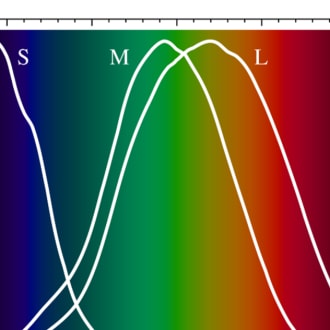
The Best Articles in Physics
The most useful articles and videos in Physics from around the web, curated by thought leaders and our community.
Refind focuses on timeless pieces and updates the list whenever new, must-read articles or videos are discovered.
Top 5 Physics Articles
At a glance: these are the articles that have been most read, shared, and saved in Physics by Refind users in 2024 so far.
Videos
Watch a video to get a quick overview.
Einstein's equations and the enigma of wormholes
Quantum wormholes are mathematically possible — but might also be physically impossible. Physicist Janna Levin explains the wormhole paradox.This interview i...
RESONANCE AND ALIENATION. TWO MODES OF EXPERIENCING TIME?
By Hartmut Rosa for TimeWorld 2019, the International congress on Time.https://timeworldevent.com/1/accueil/Hartmut Rosa is Professor of Sociology and Social...
We tried to build a nuclear fusion reactor
What’s really going on with nuclear fusion?? @Simone Giertz and I try to explain...Get your own Oura ring (I got silver, if you want to match!): https://www....
No-one knows how explosions work (yet)
The first few moments of an explosion can't be simulated yet. But there's a team at the University of Sheffield working on it. ■ A paper about their work, in...
The Counterintuitive Physics of Turning a Bike
Thanks to http://www.harrys.com for sponsoring this video – use offer code MinutePhysics for $5 off your first purchaseA HUGE thanks to Michael Aranda for ae...
What is ...?
New to Physics? These articles make an excellent introduction.
What is Schrodinger's Cat?
Schrodinger's Cat is a hypothetical thought experiment created in 1935 by a man who loved physics and hated cats.
What Is a Neutrino? The Missing Key to Modern Physics Could Be a Ghost Particle
The enigmatic saga of one of astrophysics' most wanted particles.
What is quantum entanglement? A physicist explains the science of Einstein’s ‘spooky action at a distance’
A multitude of experiments have shown the mysterious phenomena of quantum mechanics to be how the universe functions. The scientists behind these experiments won the 2022 Nobel Prize in physics.
What Is Quantum Entanglement?
Quantum bits (aka qubits), the reader is assured, are somehow "entangled" such that they rely on one another. If more detail is needed, we're told entanglement links qubits no matter how far apart they are—so long as the qubits are “coherent.” This hardly helps! So let's try a different approach.
Crisis in Particle Physics Forces a Rethink of What Is ‘Natural’
For three decades, researchers hunted in vain for new elementary particles that would have explained why nature looks the way it does. As physicists confront that failure, they’re reexamining a…
How to ...?
How to break a theory
When a theory breaks, you learn how to build it better.
«ASK WEIRD QUESTIONS Einstein had a wild imagination. He asked himself questions like: What would he feel if he rode an elevator through outer space? What would he see if he chased a beam of light?»
How To Fall 35,000 Feet and Survive
You're six miles up, alone and falling without a parachute. Though the odds are long, a small number of people have found themselves in similar situations—and lived to tell the tale.
Trending
These links are currently making the rounds in Physics on Refind.
Genius and blood: How cheap light transformed civilization
For nearly all of human history, fire was our only source of artificial light. Difficult to make and challenging to safeguard from wind and rain, fire was our first window into the darkness of night.…
Could a telescope ever see the beginning of time? An astronomer explains
Now out in space for more than two years, the James Webb Space Telescope is a stunningly sophisticated instrument.
Dark Energy Could Be Evolving Over Time, Raising Questions About the Nature of the Cosmos
The largest 3D map of the universe ever made hints that dark energy might not be a constant, though the findings must be backed up with more data
To Build a Better AI Supercomputer, Let There Be Light
OpenAI and other AI leaders think new leaps in machine intelligence will require new forms of computer hardware. One proposal involves connecting GPUs with light.
Color Wheels are wrong? How color vision actually works
Artists say all colors are a mixture of red, yellow, and blue. But physics and TV screens and printers disagree. How does color really work?
Short Articles
Short on time? Check out these useful short articles in Physics—all under 10 minutes.
Flow of time: reality or illusion?
Real time of space-time is one of the dimensions on which we comprehend and describe reality. Time neither flows, nor flies, or drags on; it doesn’t run out and is not a commodity that can be wasted.
Our Brains Completely Distort How Time Actually Happens — Here’s How To Take Advantage Of It
Researchers are attempting to understand how our interaction with our environment shapes our experience of time.
«So, when we experience fear, joy, anxiety, or sadness, emotional processing and time processing interact. This results in the sensation of time passing more, speeding up or slowing down. Time really does fly when you’re having fun, and drag when you’re bored.»
The (Often) Overlooked Experiment That Revealed the Quantum World
A century ago, the Stern-Gerlach experiment established the truth of quantum mechanics. Now it’s being used to probe the clash of quantum theory and gravity.
Physicists Who Explored Tiny Glimpses of Time Win Nobel Prize
The development of attosecond pulses of light allowed researchers to explore the frame-by-frame movement of electrons.
What the Hell is going on With Superconductors — Eric Jorgenson
Every few decades Physics produces a fundamentally new 'thing' that changes what's physically possible. - @Andercot Humanity might have just unlocked a new achievement… A very nerdy corner of Twitter…
«With zero resistance transmission materials, there could be near-zero loss of energy. Cost of energy could fall by one-third JUST by improving transmission.»
Long Articles
These are some of the most-read long-form articles in Physics.
Einstein's 7 rules for a better life
When it comes to living your best life, Albert Einstein — notorious as the greatest physicist and genius of his time, and possibly of all-time — probably isn’t the first name you think of in terms of…
«Blind obedience to authority is the greatest enemy of the truth.” In the era of fake news, this lesson is more important to assimilate than ever»
The mathematically correct way to tie your shoes
One of the major milestones of our early childhoods comes when we learn, for the first time, how to successfully tie our own shoes. As most of us learned, there are three key steps to making that…
Is there life after death?
Is there an afterlife or is this the only life we get? Most think science says there is no afterlife. But this view, while common, is wrong.
«Most believe science says there is no afterlife. But this view, while common, is wrong.»
Extra-Long Blasts Challenge Our Theories of Cosmic Cataclysms
Astronomers thought they had solved the mystery of gamma-ray bursts. A few recent events suggest otherwise.
Magnetism May Have Given Life Its Molecular Asymmetry
The preferred “handedness” of biomolecules could have emerged from biased interactions between electrons and magnetic surfaces, new research suggests.
Thought Leaders
We monitor hundreds of thought leaders, influencers, and newsletters in Physics, including:
What is Refind?
Every day Refind picks the most relevant links from around the web for you. Picking only a handful of links means focusing on what’s relevant and useful.
How does Refind curate?
It’s a mix of human and algorithmic curation, following a number of steps:
- We monitor 10k+ sources and 1k+ thought leaders on hundreds of topics—publications, blogs, news sites, newsletters, Substack, Medium, Twitter, etc.
- In addition, our users save links from around the web using our Save buttons and our extensions.
- Our algorithm processes 100k+ new links every day and uses external signals to find the most relevant ones, focusing on timeless pieces.
- Our community of active users gets the most relevant links every day, tailored to their interests. They provide feedback via implicit and explicit signals: open, read, listen, share, mark as read, read later, «More/less like this», etc.
- Our algorithm uses these internal signals to refine the selection.
- In addition, we have expert curators who manually curate niche topics.
The result: lists of the best and most useful articles on hundreds of topics.
How does Refind detect «timeless» pieces?
We focus on pieces with long shelf-lives—not news. We determine «timelessness» via a number of metrics, for example, the consumption pattern of links over time.
How many sources does Refind monitor?
We monitor 10k+ content sources on hundreds of topics—publications, blogs, news sites, newsletters, Substack, Medium, Twitter, etc.
Who are the thought leaders in Physics?
We follow dozens of thought leaders in Physics, including Live Science, Nautilus Magazine, symmetry magazine, Science Magazine, CERN.
Missing a thought leader? Submit them here
Can I submit a link?
Indirectly, by using Refind and saving links from outside (e.g., via our extensions).
How can I report a problem?
When you’re logged-in, you can flag any link via the «More» (...) menu. You can also report problems via email to hello@refind.com
Who uses Refind?
450k+ smart people start their day with Refind. To learn something new. To get inspired. To move forward. Our apps have a 4.9/5 rating.
Is Refind free?
Yes, it’s free!
How can I sign up?
Head over to our homepage and sign up by email or with your Twitter or Google account.
Keep Learning
Get the big picture on your favorite topics.





















